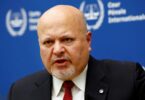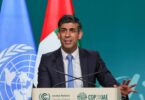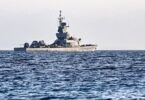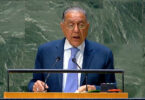Monitoring Desk
BEIJING: Beijing’s top official in Hong Kong on Monday said China was facing its worst national security threats since the end of the cold war as he condemned some political groups in the city for “colluding with anti-China forces” by accepting invitations to travel abroad for secretive meetings.
Wang Zhimin, director of the central government’s liaison office in Hong Kong, also hit out at the Occupy movement of 2014, calling it a threat to Hong Kong’s public security and damaging to the city’s rule of law.
In a speech at the National Security Education Day Hong Kong Symposium in Admiralty, Wang praised the convictions last week of nine leaders from the civil disobedience movement on at least one count each of conspiracy to cause public nuisance, inciting others to cause public nuisance, or inciting others to incite. The three charges each carry a maximum punishment of seven years in prison. The nine will be sentenced on April 24.
“The day they were convicted was an important one for upholding the rule of law,” Wang said.
The official added China was facing “the worst national security threats since the end of the cold war”.
“Some ill-intentioned countries want to check China’s development by leveraging Hong Kong, while some Hong Kong politicians and political groups collude with these anti-China forces by organising secretive meetings.
“They are using Hong Kong taxpayers’ money to travel abroad and sell Hong Kong for their own interests. Such deeds will be scorned by Hong Kong people, by all Chinese people and by their own ancestors,” Wang said, without naming any country, political group or individual.
Last month two lawmakers, Dennis Kwok and Charles Mok, were invited on a 10-day trip to the United States by the White House along with Hong Kong’s former No 2 official Anson Chan Fang On-sang.
Hong Kong’s former No 2 Anson Chan meets Mike Pence in Washington
Their visit included a meeting between Chan and US Vice-President Mike Pence and discussions with members of America’s National Security Council.
The trio voiced their concerns over the Hong Kong government’s proposal to allow the transfer of fugitives to mainland China. They said they wanted to highlight the issue “before it was too late” and urged the US government to continue to support the city’s basic freedoms, which they said were being steadily whittled away.
On Monday Wang also lashed out at the 2014 Occupy protests, when tens of thousands of protesters took part in sit-in demonstrations on the streets of the city’s commercial districts for 79 days calling for universal suffrage in electing the city’s leader.
Wang condemned the movement as “a wound to the rule of law, to people’s livelihoods and to society in general”, and urged Hong Kong to learn a lesson from “the pain of losing security”.
“Without national security, Hongkongers won’t have peaceful and happy lives … Hong Kong won’t have prosperity and stability … The ‘one country, two systems’ principle won’t be able to sustain itself,” Wang said.
Since Hong Kong was handed over to China by Britain in 1997, Beijing has ruled it under the one country, two systems principle to allow Hong Kong a high degree of autonomy.
Speaking before Wang gave his speech, Hong Kong leader Carrie Lam Cheng Yuet-ngor said the local government supported the symposium because national security was important and covered many aspects in people’s daily lives, but she lamented that Hongkongers had only a “vague understanding and weak awareness” of it for historical reasons and due to deficient education.
Lam said her administration would not sit back and allow subversive and separatist acts even though the city had not yet drafted its own national security legislation, as prescribed by Article 23 of the Basic Law, the city’s mini-constitution. The government’s banning of the pro-independence Hong Kong National Party (HKNP) last September was an example of this, according to Lam.
“We are almost finished drawing up the report on handling the HKNP, which was requested by the central government in February,” she said. “I expect to submit it soon and to disclose the full report to the public, provided it doesn’t affect subsequent legal action.”
The annual forum is the second one organised by the Hong Kong Policy Research Institute and Hong Kong Vision, a think tank and the institute’s flagship research project, which is convened by the city’s former Legislative Council president Jasper Tsang Yok-sing. The aim is to promote public education on national security in Hong Kong.
Also present at the symposium were former chief executive and a current vice-chairman of China’s top political advisory body, Tung Chee-hwa; Deng Zhonghua, a deputy director of Beijing’s Hong Kong and Macau Affairs Office; and a string of senior Hong Kong officials. They included Chief Secretary Matthew Cheung Kin-chung, Financial Secretary Paul Chan Mo-po, security minister John Lee Ka-chiu, constitutional and mainland affairs minister Patrick Nip Tak-kuen, and police commissioner Stephen Lo Wai-chung.
Paul Chan in his speech said that Hong Kong had played a vital role both as a proving ground for reforms and a firewall against risk as mainland China sought to open its market and internationalise its currency.
“We clearly know that ensuring financial security in Hong Kong is not only very important for the city’s economy and society, it’s also defending national financial security,” Chan said.
Courtesy: (scmp.com)






